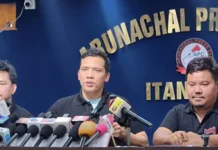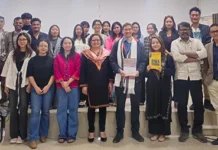[ Tongam Rina ]
ITANAGAR, 10 Feb: The project affected families, under the banner of the Project Affected people’s Forum, have written to the Centre, stating that the Forest Advisory Committee (FAC) should not take cognisance of individuals and groups who are opposed to the 3,097 mw Etalin Hydroelectric Project in Dibang Valley district by M/s Etalin Hydroelectric Power Company Limited – a joint venture of the Jindal Power Limited and the Hydropower Development Corporation of Arunachal Pradesh Limited.
In a letter sent to the ministry of environment and forest, the organisation said that a “strong message must be issued to the FAC not to entertain these sorts of complaints. Such people, not being a part of the project affected area cannot be and must not be allowed to influence the decision for forest clearance to the project.”
On 27 December last year, the FAC had asked for a revised proposal for diversion of 1165.66 ha (including 91.331 ha underground area) of forest land for the construction of the 3,097 mw project, stating that the proposal had been sent in 2014, and that “it is imperative to review the facts and figures present by the state, especially with regard to the number of trees which are required to be felled.”
The FAC’s sub-committee further suggested that a multi-seasonal replicate biodiversity study may be carried further to include multi-seasonal replicate study, as desired by the FAC earlier, and that a cumulative impact assessment is needed, considering other projects in the Dibang valley.
The meeting also noted that there were a large number of representations voicing concerns against the project. It had said that the state government may constitute a high level empowered committee to look into the various concerns received and come up with resolution therein.
The sub-committee constituted by the FAC earlier under the chairmanship of Dr Sanjay Deshmukh had looked into the representations received and submitted a report with recommendations. However, there are more representations which were received by the ministry after the visit of the sub-committee as well, it said.
Several individuals and Idu Mishmi Youth, Lower Dibang Valley and Dibang Valley, in a letter to the ministry had opposed the project stating that “free, prior and informed consent should be sought from all affected communities upstream, downstream and elsewhere where the project’s various components are located, including mitigative and ameliorative measures. The viability of the project must be re-examined in light of the rapidly changing river hydrology due to accelerating climate change, which puts safety of the indigenous Idu Mishmi people of Dibang Valley and millions of others downstream of the project at grave risk.”
Following large-scale representation against the project, the FAC in May last year had constituted a committee to examine the representations against the project, after which the committee headed by Dr Deshmukh met several representatives in Roing.





